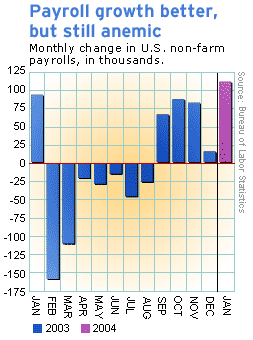NEW YORK (CNN/Money) - Job cuts planned by big corporations fell 34 percent last month from January but businesses remain cautious about hiring, an outplacement firm reported Tuesday.
U.S. businesses announced 77,250 job cuts in February, down from 117,556 in January, according to Chicago-based Challenger, Gray & Christmas, which keeps track of monthly job-cut announcements.

February's announcements were about 44 percent lower than those of February 2003, when 138,177 cuts were announced.
Employers have announced 194,806 job cuts so far this year, 28 percent fewer than in the first two months of 2003, when companies said they were cutting 270,399 jobs, the firm said.
But Challenger warned that businesses still seemed cautious about hiring, noting that job-cut announcements have averaged more than 100,000 over the past six months, nearly double the average rate from 1998-2000, when jobs were booming.
The firm also noted that consumer product companies and industrial goods manufacturers together had announced 51,606 job cuts this year, more than double the level of a year earlier.
"The increase in planned job cuts could indicate that firms in the two sectors are not very confident about future business conditions," the firm's CEO, John Challenger, said in a statement.
| Related stories
|

|
|
|
|
Industrial goods makers led the job cutting in February, announcing 13,216 cuts. Food companies announced 9,609 cuts, health-care firms announced 7,007 cuts and financial firms announced 6,375 cuts.
Among states, Illinois saw the most announcements, with 7,103. Arkansas followed with 6,140, Louisiana with 4,885, Texas with 4,538 and Virginia with 4,416.
Challenger's numbers shouldn't be confused with actual tallies of layoffs. They include moves to trim payrolls by not replacing workers who leave voluntarily, offering early retirement or other measures.
The government is set to report on the national unemployment rate and U.S. payrolls for February on Friday. Economists, on average, expect unemployment held steady at 5.6 percent and that payrolls grew by 125,000 outside the farm sector, according to a survey by Briefing.com.
A pickup in the job market typically lags behind a recovery in the broader economy.
For example, gross domestic product, the broadest measure of the economy, has grown for nine straight quarters, including a blistering 8.2 percent growth rate in the third quarter of 2003 -- the fastest in 20 years -- without significant job creation.
More than 2.3 million jobs have been lost since the labor market's peak in February 2001, and nearly 800,000 of those were lost after the end of the latest recession in November 2001, according to Labor Department statistics. That would make this recovery the most "jobless" since World War II.

|

